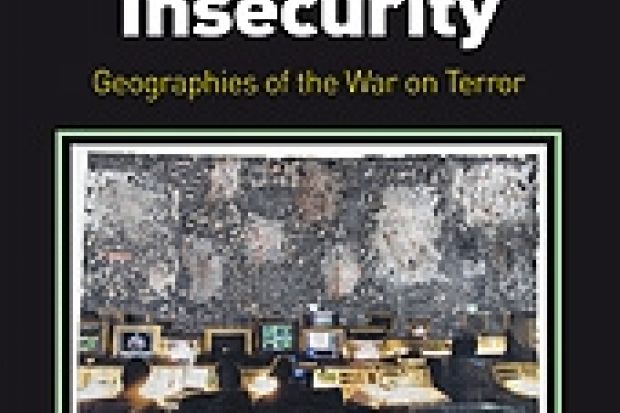As fans of the hit television series 24 will know, Jack Bauer is the gutsy hero who races against the clock to save America from terror attacks. For some, including Michael Chertoff, the former US Secretary of Homeland Security, Bauer's exploits are not merely good fiction, they are good moral philosophy, too, in touch with the tough "real-life" decisions necessary to keep America safe. Perhaps this is why Chertoff has defended Bauer's willingness to resort to "extrajudicial" measures.
Spaces of Security and Insecurity, edited by Alan Ingram and Klaus Dodds, begins with a discussion of Jack Bauer, but not in a way likely to please Chertoff. Ingram and Dodds care little for what Bauer offers by way of political allegory. They are more interested in what TV series such as 24 and a host of other everyday examples - be they tales of immigration-processing centres, politically resonant art installations or the subtle invocation of guilt, innocence and revenge in a public memorial service - tell us about the making of security discourse and practice.
The result is a fascinating cross-section of contemporary understandings of security that take us well beyond stock-in-trade critiques of the political lassitude and legal effrontery of Western states, particularly the previous US Administration.
Such a task could have been undertaken within a range of academic disciplines, of course, but this book is overwhelmingly the work of geographers. Although they are aware of the moral, legal, ethical and political questions posed by the subject matter, the main points they raise are primarily geographical ones. And while Ingram and Dodds' overarching aim may be to explore the production of security discourse within variously non-political and cultural arenas, they do so only after covering geography's more traditional base - geopolitics. The result is a satisfying analytical arc, which begins with an international- relations critique of Tony Blair's vision of "just" war and ends in artwork that projects security plans from Baghdad on to a map of Brussels to bring the "urban geopolitics" of the Iraqi capital closer to home.
Inevitably, some chapters pull off the double trick of cultural and political analysis better than others. One of the more successful ones, by Alex Jeffrey, considers how Britain and America's "geopolitical scripting" of Iraq helped make the case for war by shifting the local threat posed by Saddam Hussein into a global one. It also made possible the "cure" of a neoliberal state by erasing a series of other inconvenient histories, wherein Iraq itself was failed repeatedly by colonial and Cold War powers.
Perhaps the most interesting chapter is by Jason Dittmer, who considers how members of a web forum for pre-millennial dispensationalists (an important branch of American evangelical Christianity) interpret current geopolitical events in the Middle East in terms of religious belief.
In showing how these individuals set about securing their own peace of mind, which involves preparing for an apocalyptic series of events that will culminate in the Rapture (when true believers will ascend to heaven while non-believers are left behind), Dittmer reveals the discursive mechanisms by which violence can come to be welcomed on the grounds of providing emotional security for those who stand behind it. In doing so, he underscores the zero-sum logic that says security is something that we possess in proportion to the insecurity of others.
Dittmer's point echoes throughout the book. While some states are being broken up into ever less state-like parts, making intervention an easier task, others are busy hardening their borders through the securitisation of immigration and asylum legislation. This geographical unevenness in the manner and extent to which security is pursued through territorial proxy is sustained by cultural processes that normalise some definitions of security as they disavow others. This book is especially welcome for the way it picks apart this process. In doing so, it shows that if security has become perhaps the dominant paradigm of the War on Terror in Western states, it is based not only upon expanded police powers and identity cards but also on a raft of more subtle cultural practices that respond to and inform actual political events.
Such lessons would be anathema to Jack Bauer's ears, of course, but hopefully not to those of Janet Napolitano, the new Secretary of Homeland Security, or of Barack Obama. When Obama signed an executive order to close permanently the Guantanamo military prison within a year, he stated that he was returning America to "the moral high ground". That is a fine aim, of course. But as this book so convincingly argues, the high ground may have little to do with it: security concerns run deep within cultural and political life, and we should exercise scrutiny, not surveillance there, too.
Spaces of Security and Insecurity: Geographies of the War on Terror
Edited by Alan Ingram and Klaus Dodds
Ashgate, 302pp, £60.00
ISBN 9780754673491
Published 16 April 2009
Register to continue
Why register?
- Registration is free and only takes a moment
- Once registered, you can read 3 articles a month
- Sign up for our newsletter
Subscribe
Or subscribe for unlimited access to:
- Unlimited access to news, views, insights & reviews
- Digital editions
- Digital access to THE’s university and college rankings analysis
Already registered or a current subscriber? Login
